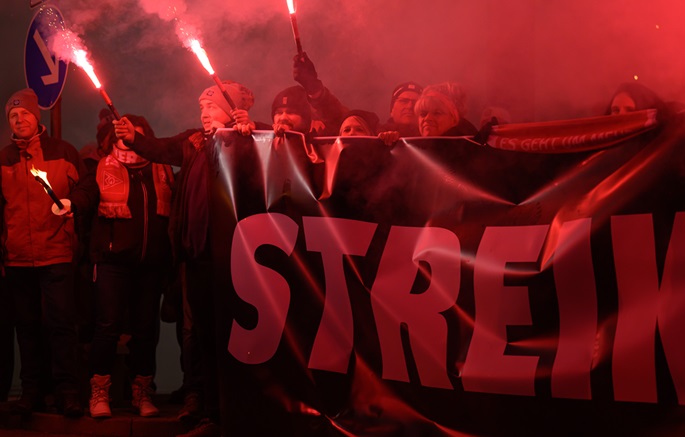Volkswagen braces for strikes called for Monday
Published : 01 Dec 2024, 21:29
The IG Metall trade union has called for widespread labour strikes at all Volkswagen plants in Germany from Monday as workers at the company fight back against possible lay-offs and wage cuts.
Production will be "temporarily on hold" at all of the German automotive giant's plants in Germany, announced Thorsten Gröger, IG Metall's chief negotiator, who also warned of "strikes that the company cannot ignore."
Volkswagen, Europe's largest carmaker, has been demanding across-the-board wage cuts for workers, and has threatened plants closures and mass lay-offs as part of a major cost-cutting programme to boost sagging financial results.
With the walkout, the trade union hopes to increase pressure on the company in the dispute over multi-billion-dollar wage cuts.
"We don't want this conflict - but we will continue it as long as the executive board only focuses on cuts and lay-offs instead of prospects," said Gröger. "If necessary, this will be one of the toughest conflicts Volkswagen has ever seen."
A Volkswagen corporate spokesman said the company has been preparing for a possible strike, but did not provide details about what disruptions are expected.
"We want to minimize the impact of the warning strike on our customers, our partners and our industrial plants as much as possible," the company spokesman said. "That is why the company has already taken specific measures in advance to ensure emergency supplies."
Bitter battle ahead?
Labour leaders have vowed to wage an intense struggle against any such cuts. Collective bargaining talks between VW and the IG Metall trade union are currently ongoing, but have yielded little agreement so far.
According to the Volkswagen works council, at least three Volkswagen plants in Germany and tens of thousands of jobs are under threat.
Volkswagen management has justified the cuts by citing high costs and low capacity utilization at the company's plants in Germany. According to the works council, the Group is looking to save an additional €5 billion ($5 billion).
"There is a lot of frustration among the workforce," said the VW Works Council's leader, Daniela Cavallo, who expects a large share of VW workers to join in the strikes and "let off some steam."
A mandatory labour truce at VW, which prohibited strikes, expired on Saturday.
The Volkswagen spokesman said the company "respects the right of employees" to take part in short strikes, and will rely on constructive dialogue with trade union leaders in order to reach a sustainably and mutually agreeable deal.
Further talks upcoming
Both sides will meet for their next round of wage negotiations on December 9.
On Wednesday, Volkswagen Group chief executive Oliver Blume is scheduled to address the workforce at a labour meeting in Wolfsburg. German Labour Minister Hubertus Heil is also expected to attend as a guest speaker.
The talks directly apply to about 120,000 workers at Volkswagen's plants in western Germany, although any agreement would also have direct implications for another 10,000 workers employed at Volkswagen plants in the eastern German state of Saxony.
Volkswagen cancelled its long-standing job security agreement with workers in September, clearing the way for lay-offs as soon as July.
Volkswagen has never shut down a plant in Germany, and it's been decades since the carmaker has closed a production facility anywhere in the world.
National concern over VW future
Volkswagen has long been seen as one of Germany's great industrial success stories, and its rise in the aftermath of World War II is widely seen as a key part of the post-war economic boom in West Germany known as the "economic miracle."
Trouble at Volkswagen has drawn major attention in Germany, where there is growing concern about the future of the industrial manufacturing base and the continued viability of the country's export-oriented economic model.
VW execs sticking with cuts
In a recent interview, Volkswagen brand boss Thomas Schäfer defended the cost-cutting course as necessary, and said that he didn't see a way to hit targets without shutting vehicle and component plants
"We have to reduce our capacities and adapt them to the new realities," Schäfer said.
Volkswagen had previously stated that, due to weak demand in Europe, the company currently has unused capacity to produce about 500,000 additional vehicles every year at its plants, or roughly the total capacity of two entire factories.
The factories in Dresden and Osnabrück in particular are considered to be at risk, although the Handelsblatt newspaper has reported that VW is also considering the closure of the plant in Emden, which could reportedly save around €600 million.
However, nothing has been decided yet. VW itself has not yet provided any information on specific locations.


